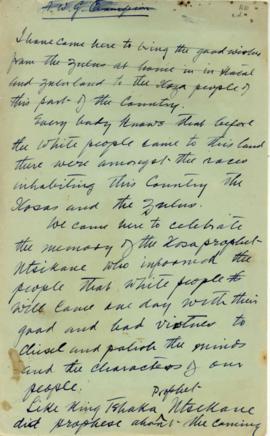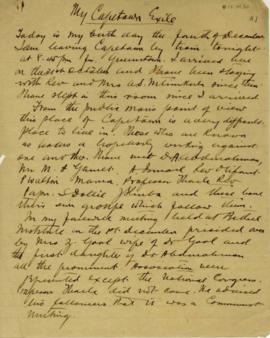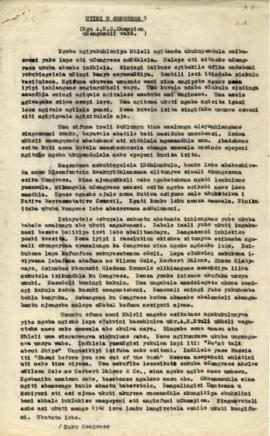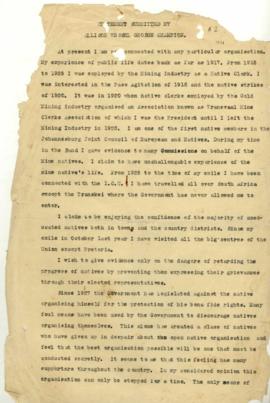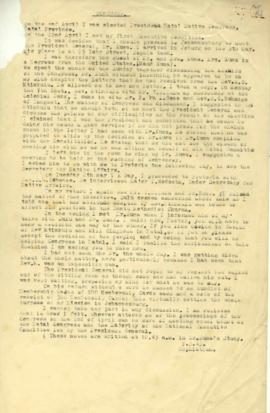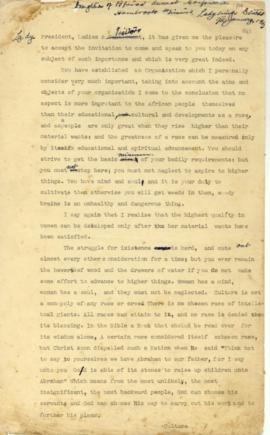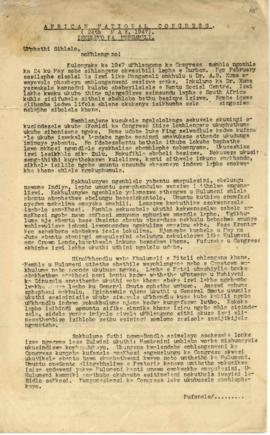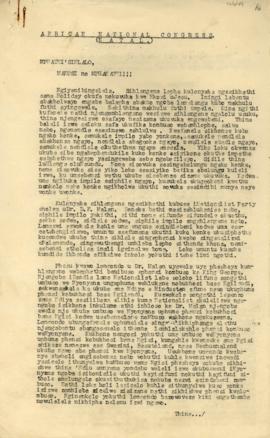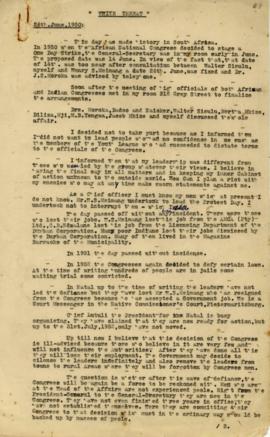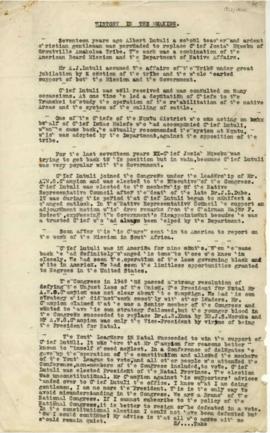Zone d'identification
Cote
Titre
Date(s)
- 1925 - 1959 (Production)
Niveau de description
collection
Étendue matérielle et support
Zone du contexte
Nom du producteur
Notice biographique
Champion, A.W. George - Mahlathi (African politician and entrepreneur) 1893-1975
Alison Weasels George Champion, born in Natal in 1893, was named after an American missionary who had adopted his father. After an abbreviated schooling at Amanzimtoti Zulu Training College - later Adams College he became a policeman in Johannesburg, Natal and Zululand until World War1 then a mine clerk and first President of the Transvaal Native Mine Clerks Association; by the early 1920's he was becoming increasingly prominent as an African spokesman, particularly by means of the forum provided by the Johannesburg Joint Council.
In 1925 Champion met Kadalie and shortly thereafter joined the ICU, first as its Transvaal, and subsequently, Natal Secretary. Under Champion, the Natal branch soon became the strongest. However, a personality clash - amongst other reasons - with Kadalie, led to a split within the ICU, Champion forming the ICU Yale, Natal. In 1930, having been accused of fomenting unrest at the time. of the Durban Boer Protests of 1929, Champion was banished from Durban until pardoned in 1933.
Champion meanwhile, had become active in the African National Congress, siding with the more progressive faction within the Congress in the late 1920's and serving as Minister of Labour under J.T. Gumede. A right-wing backlash against Gumede's policies brought Pixley Seme to the fore and simultaneously cost Champion his position in the inner councils of Congress. In 1937 Champion returned to the executive of Congress, where he remained for the next 14 years.
The Natal Congress under Dube's leadership since its inception, had become increasingly stagnant and insular; when Dube resigned in 1944, a power struggle developed between Mtimkulu, his designated successor, and Champion. A Congress Youth League had been formed in Natal in the course of 1944 and, seeing in Champion a character capable of bringing the aberrant Natal Congress back into the main stream of Congress politics, the younger members of Congress backed Champion.
He served as President from 1945-1951. Relations with Xuma deteriorated in this period; aware of Champion's power to command popular support, Xuma had been prepared to make compromises and concessions to avoid any antagonism developing between them. However, as Congress gradually began to move in a more progressive direction, swayed by the Youth League and the broad left, concessions to Champion became Increasingly difficult as his rear-guard actions intensified. Convinced that the Youth League was 'driving the train against the red light' he warned that precipitate action would be fatal for Congress. In 1451 he was succeeded as Natal president by a less controversial figure, Albert Luthuli.
Champion had been involved in other forms of political activity in this period. In 1942 he had been elected to the Natives Representative Council, and was re-elected in 1945 and 1948 - eventually becoming one of the last people to remains a member of the discredited council. In addition, Champion chaired the Durban Combined Advisory boards for many years, a portfolio that complemented his essentially reactionary beliefs.
One dimension to his popularity lay in his appeal to Zulu ethnicity. Indeed, he devoted much time to establishing a National Fund in the name of the Zulu nation, aimed at promoting economic development by stimulating entrepreneurship with loans. The sums collected were small however, and after his death were incorporated into the Luthuli Memorial Fund. Of more lasting impact was a scheme he claimed to have instigated - the Bantu Investment Corporation, established in 1959 to promote African enterprise in the reserves.
Champion died in 1975.
Histoire archivistique
Source immédiate d'acquisition ou de transfert
Zone du contenu et de la structure
Portée et contenu
Abbreviations:
AAC - All Africa Convention.
ANC - African National Congress.
CNETU - Council of Non-European Trade Unions.
ICU - Industrial and Commercial Workers Union.
NIC - Natal Indian Congress.
NRC - Natives Representative Council.
SANNC -South African Native National Council.
Évaluation, élimination et calendrier de conservation
Accroissements
Mode de classement
Zone des conditions d'accès et d'utilisation
Conditions d’accès
Conditions de reproduction
Copyright Historical Papers Research Archive, The Library, University of the Witwatersrand, Johannesburg, South Africa
Langue des documents
Écriture des documents
Notes de langue et graphie
Caractéristiques matérielle et contraintes techniques
Instruments de recherche
Instrument de recherche téléversé
Zone des sources complémentaires
Existence et lieu de conservation des originaux
Existence et lieu de conservation des copies
Unités de description associées
Zone des notes
Note
The digitisation of this collection has been made possible with generous funding from the Atlantic Philanthropies Foundation.


